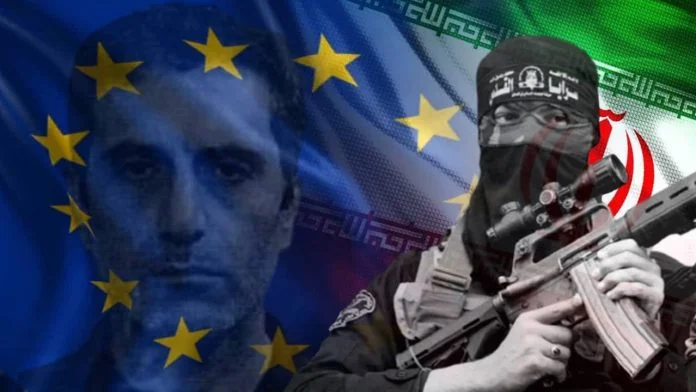Prof. Vidal-Quadras’ Would-be Assassin Was Granted Impunity by The West

Iran-EU-terrorism-assadollah-assadi-28012021
Written by
Shahriar Kia
“While the regime’s belligerence has engulfed the Middle East, its terrorism has jeopardized the security of European politicians and citizens. Nevertheless, the bullet that struck Mr. Vidal-Quadras in the face was a disgrace to the policy of appeasing Khamenei.”
These were the words spoken by Mrs. Maryam Rajavi, President-elect of the National Council of Resistance of Iran at a European Parliament conference in Strasbourg on November 22. And she is right.
As Spanish law enforcement and counter-terrorism experts diligently pursue hard evidence to find the perpetrators of the assassination that aimed to eliminate one of the thousands of European politicians who are openly advocating for regime change in Iran, a compelling body of substantial, circumstantial, and analogical evidence points unmistakably to Tehran.
The clarity of statistical data, discernible patterns, historical performance trends, connections with criminal organizations, the prevailing political context, and discernible motives leave little room for ambiguity. It doesn’t take a detective to grasp the glaring reality of who stands to gain the most from such a heinous act. Those attempting to attribute the terror attempt to internal political strife, a narrative that recklessly undermines Spanish democratic stability, are actually serving the interests of the perpetrators in Tehran.
The central inquiry goes beyond the identity of the trigger-puller; rather, it revolves around the genesis of the motive. Once the crucial link is established, transforming the narrative from a criminal act to a politically motivated one, the question arises: are those in positions of authority capable or willing to acknowledge this shift in perspective?
As we approach the critical juncture of decision-making, I’m afraid that based on historical precedents, Prof. Vidal-Quadras’ assassination may serve as merely the inaugural chapter in a harrowing saga of the Iranian regime’s global campaign of murdering Western statesmen. Here is why:
When an individual criminal assaults you, they get arrested by the police. Similarly, in a just legal system, if a gang of thugs commits a crime, the entire gang is gone after and duly punished. However, if law enforcement begins to reconsider pursuing justice due to the gang’s extensive network, strength, or sheer brutality, entertaining the idea that upholding the law might not be worth the associated challenges, we run the risk of bidding farewell to the very foundation of the rule of law.
THREAD
For more than four decades, the clerical regime in #Iran has consistently blackmailed other nations and considered #extremism as "leverage". 1/9https://t.co/ieaaOkZb6y pic.twitter.com/W9u5BJHXqs— NCRI-FAC (@iran_policy) September 6, 2022
Hard evidence shows that the Iranian regime has engaged in a reprehensible pattern of kidnapping, murder, and forced disappearances of citizens across the globe over the last four decades. Employing its own version of carrots and sticks, Tehran’s combination of economic incentives and coercive tactics ensures the compliance of the countries harboring the regime’s perpetrators, allowing them to evade accountability. This international inaction has communicated to the Iranian regime that there is no loss in the terrorism business.
A significant incident that has been widely reported ever since, the regime confidently used an official diplomat to try to bomb and kill hundreds of international leaders at the Free Iran World Summit in France in 2018. Prof. Vidal-Quadras was among the people who sat next to Mrs. Rajavi, the primary target of that assassination attempt. Even though European law enforcement and the judicial system did their job, arresting and sentencing Asadollah Assadi to 20 years behind bars, he was released by the Belgian government in 2023 confirming that the coercion policy still works perfectly.
The regime’s extortion tactics extend beyond individual targets; entire states and populations find themselves held hostage. Through the arming, funding, training, and commanding of militias across the Middle East, Tehran has disrupted political processes and stifled socio-economic progress in neighboring societies. Operating the world’s largest state-operated narcotic network, it poisons global communities to fund its malicious agenda.
En el juicio que se celebra en Bruselas al diplomático Assadolah Assadi por el frustrado atentado terrorista en 2018 en Villepinte (Francia), el fiscal ha señalado la autoría intelectual del Gobierno de Irán. ¿Qué hará Borrell al respecto?
— Alejo Vidal-Quadras (@VidalQuadras) November 30, 2020
In defiance of numerous United Nations resolutions, Tehran persistently advances its ballistic missile and drone programs, actively contributing to the prolongation of conflicts worldwide. Violating international treaties under the International Atomic Energy Agency, the regime boasts about possessing near-weapon-grade nuclear material. In the face of these provocations, the international community hesitates to take decisive action, fearing further escalation from Tehran, as if maintaining the current state of affairs is desirable.
Since the early 1980s, the Iranian Resistance has consistently alerted the world to the dangerous nature and agenda of the Iranian regime. However, the international community has witnessed this perilous entity grow and extend its influence unchecked, penetrating deep into the very fabric of their societies. In return for their efforts, the resistance movement not only received little credit but also faced brutal and multifaceted repression from Western powers.
If the events of October 7th are not sufficiently convincing to connect the dots and draw conclusions, if the assassination attempt against a prominent politician in broad daylight in Madrid fails to serve as a wake-up call, then the world must brace itself for even more dire and far-reaching consequences to come.
Prof. Vidal-Quadras’ Would-be Assassin Was Granted Impunity by The West

